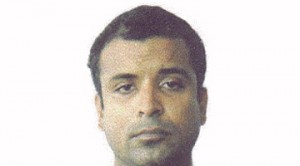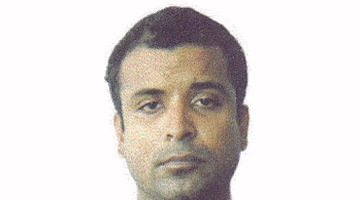Lawyers for Guyanese drug accused Roger Khan have alleged that he was instrumental in the removal of a senior Guyana Defence Force (GDF) officer from his post because of the officer’s reported links to members of the criminal gang in Buxton.
According to a motion filed by the lawyers, the officer could not have been one of Khan’s co-conspirators because Khan was responsible for him being removed from his post. They contend that the officer was in league with prison escapee Shawn Brown who was responsible for kidnapping former US diplomat Stephen Lesniak.
The motion was in response to one filed by the US government which is seeking to quash the subpoenas the defence sent to a number of US agencies and officials. The prosecution has contended that the documents and testimony relating to the kidnapping of Lesniak which Khan has subpoenaed were “completely irrelevant to the drug charges at issue in this case.” The government argued that even if Khan played a role in Lesniak’s release or the capture of his kidnappers and provided information about the kidnapping to US agents, that did not make it more or less probable that he simultaneously engaged in drug trafficking.
 However, Khan’s lawyers said that while his coordination did not preclude simultaneous drug trafficking, the evidence had a “tendency,” to make it less probable, and a jury could so conclude.
However, Khan’s lawyers said that while his coordination did not preclude simultaneous drug trafficking, the evidence had a “tendency,” to make it less probable, and a jury could so conclude.
“Moreover, the relevance of evidence pertaining to the Lesniak kidnapping is broader than the government addresses. The fact that Lesniak was kidnapped and taken to the village of Buxton – about which fact he could testify – is significant. [Name of GDF officer] was in charge of the military force responsible for bringing the Buxton criminals under control, but was in fact in league with them – including Shawn Brown, who kidnapped of Lesniak,” the motion by Khan’s lawyers said.
According to the lawyers, the evidence will show that the officer was supportive of the kidnapping and deliberately delayed at a military checkpoint a search party which had learned through Khan’s intelligence activities, the precise location of Lesniak, and as such compromised the search.
“Khan’s coordination with the US agents in seeking Lesniak’s release and the capture of his kidnappers, like Khan’s coordination with the agents subsequently was directed at ending [name of GDF officer’s] subversive activities at Buxton,” the motion stated. The lawyers also stated that such evidence supported the conclusion that Khan and the officers were enemies, and thus not likely co-conspirators.
They said that US agents with whom Khan coordinated and whom he has subpoenaed – Chris Carbonneau, Tony Velasquez, Michael Johnson and Laz Andino – were all in a position to testify about Khan’s efforts directed at the officer.
According to the lawyers, the documents which Khan has subpoenaed in connection with the Lesniak kidnapping and its aftermath might appear non specific but were essentially designed to obtain documents showing communications with Khan as evidence of his coordination with the US agents.
The prosecution has also contended that testimony concerning Khan’s March 2006 meeting in Guyana with US officials and related documents, including tape recordings of former police commissioner Winston Felix were irrelevant.
However, the lawyers said the testimony of DEA Agent Gary Tuggle would establish that at the meeting Khan provided information about the GDF officer’s criminal activity, tending to make it less probable that Khan and the officer were co-conspirators.
And the US government’s argument that Khan’s statements at the March 2006 meeting were inadmissible hearsay was not correct, according to the defence. “The statements would not be offered for their truth—that is, that the information provided by Khan at the meeting is true—but for the fact that Khan was providing this information to US officials,” the lawyers said.
As to the alleged tape recordings of Felix, the US government argued that Khan did not provide any reason why it would be relevant to the charges against him, adding that all the tapes could show was local corruption.
“But that is the point,” Khan’s lawyers argued. “If Khan was trafficking in drugs and Felix was corrupt, Khan hardly would want to expose Felix, quite the contrary – and so a jury could conclude. This is especially so since Felix was in control of drug interdiction at the international airport in Guyana, from which, as the evidence at trial will show, cocaine was exported to the United States.
Thus, a jury could easily conclude that Khan’s exposure of Felix’s corruption makes it less probable that Khan was involved in exporting cocaine.”
Meanwhile, the prosecution has sent to Judge Dora L Irizarry, a copy of the Stabroek News article in which former national cyclist Tyrone Hamilton denied telling the defence that he knew who killed Davendra Persaud. The prosecution said it felt the court might find it relevant “in assessing the credibility of the factual assertions contained in the defendant’s opposition to the government’s motion…”
In their motion opposing the US government’s request, Khan’s lawyers had denied that their client killed Persaud and former boxing coach Donald Allison and alleged that Allison could have been killed because he was supplying guns to an anti-government gang in Agricola.
The defence lawyers stated that in the case of Persaud, they had interviewed Hamilton, who was with Persaud at the time he was killed. According to the defence, Hamilton provided them with the name of the person who shot Persaud — a person with whom Hamilton was familiar — and had stated that it was neither Khan nor anyone associated with Khan. Hamilton later denied to Stabroek News ever telling the lawyers who had killed Persaud.
The prosecution also wants to introduce as evidence that the drug accused was responsible for the murder of Agricola boxing coach Allison. Khan had said through his lawyers that Allison had strong links with the Buxton criminal gang and had supplied arms to them. However, the US government had said that Allison had insulted Khan in public and as a result, Khan had ordered his execution.

